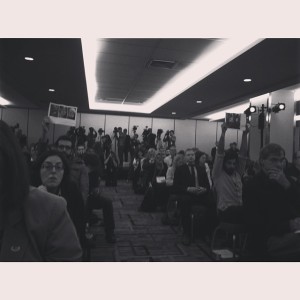NEW YORK — Iranian President Hassan Rouhani said this week in his first public speech before he went to the United Nations that he opposed Western intervention in Mideast violence and touted Iran’s potential to be a regional diplomatic leader.
The talk Wednesday was part of a New America Foundation event that featured a keynote address by Rouhani and a subsequent conversation between him and journalist Fareed Zakaria. The event was billed as Rouhani’s first public speaking engagement before his Thursday United Nations General Assembly address. It came on the heels of Iranian Supreme Leader Ayatollah Ali Khamenei’s announcement that the Iranian government would not align itself with the United States in its war on the Islamic State.
Asserting that extra-regional Mideast involvement “feeds and strengthens terrorism,” Rouhani said lifting nuclear sanctions would let Iran truly step up to the diplomatic plate.
“If the Islamic Republic of Iran could reach a comprehensive agreement on its nuclear program and leave sanctions behind, it will be able to assume a more active role in the process of intra-regional dialogue in the Islamic world,” he said during his speech.
Rouhani said Iran is the regional nation capable of battling the Islamic State in Iraq, citing its defense of Irbil and provision of military advisers to assist the Iraqis and Kurds as examples of efforts it has undertaken.
He insisted that the past 12 months’ worth of nuclear-adherence efforts by Iran were proof of goodwill and a willingness to build international trust in Iran’s nuclear program.

Protesters at Iranian President Hassan Rouhani’s talk in New York City in September 2014.
“The precise measures implemented by us during the past year were geared towards showing the serious and firm commitment at the highest levels, meaning that under no conditions we will try to build, stockpile or use any type of nuclear weapons,” Rouhani said.
Though Rouhani said timely action against the Islamic State was needed, he called it “nothing more than a terrorist group” that “typifies a violent extremism.” He said the 2003 American attack on Iraq and subsequent invasions birthed terrorist groups and suggested the unrest following the American occupations of Iraq and Afghanistan “nurtured” the extremism.
But he was careful to note that this sentiment wasn’t meant as an attack on the U.S.
“My intent here is not to assign blame or to rehash history,” Rouhani said. “I only seek to show that the imposition of one’s will on societies and other nations with the use of violent and extremist methods is not possible, is not successful, nor is it useful.”
“Even though it may yield the desired results over the short term, over the long term, it will only create tragedies,” he explained.
In the same vein, during his conversation with Zakaria, Rouhani expressed fears that American training of Free Syrian Army fighters to fight the Islamic State in Syria could inadvertently lead to the creation of a new terrorist group. He also said he supports the empowerment of Syria to make its own decisions.
National Iranian American Council President Trita Parsi said Rouhani’s pushback against extra-regional Mideast intervention was consistent with an Iranian desire for the presence of “major foreign powers” in the Mideast to be greatly limited.
“That’s a longstanding Iranian position that precedes this regime because at the end of the day, it leads to a scenario in which Iran winds up becoming one of the key players in the region,” Parsi said in an interview.
Parsi also said that American interventions in Syria that could be perceived as being aimed at displacing Assad – whether or not that is the government’s actual intent – could make Iran dubious of American involvement in the fight against ISIS because it “affects the context” of U.S.-Iran negotiations.
“It’s not necessarily affecting the negotiation variables, but that context does impact the negotiations.”
New America Foundation Senior Fellow and Iran Initiative Director Suzanne DiMaggio, who delivered the event’s welcoming remarks, said that it was intended to try and bridge the communication gap between the U.S. and Iran in the midst of a 35-year halt in official diplomatic relations.
“Here at New America, we’re really dedicated to generating ideas [about] how to solve problems, and the only way you can do that is through dialogue and through debate,” DiMaggio said.
However, she warned that “a sobering approach” was needed to improving U.S.-Iranian relations due to “profound differences” between the two nations.
“I think what we’re seeing is maybe not the normalization of relations, but maybe we’re getting to a point where Americans and Iranian officials can sit down together on a regular basis and talk about issues,” she said.





